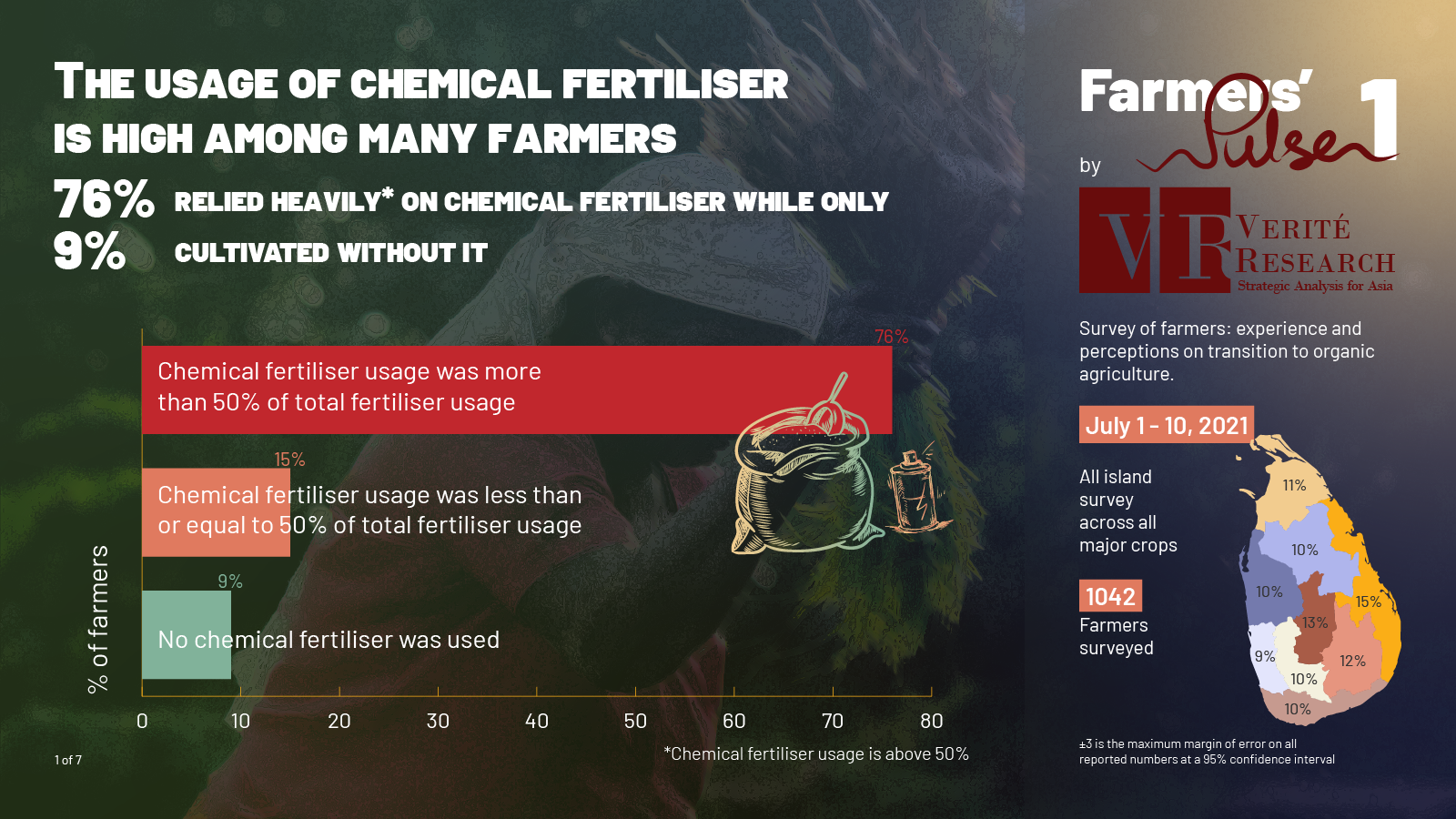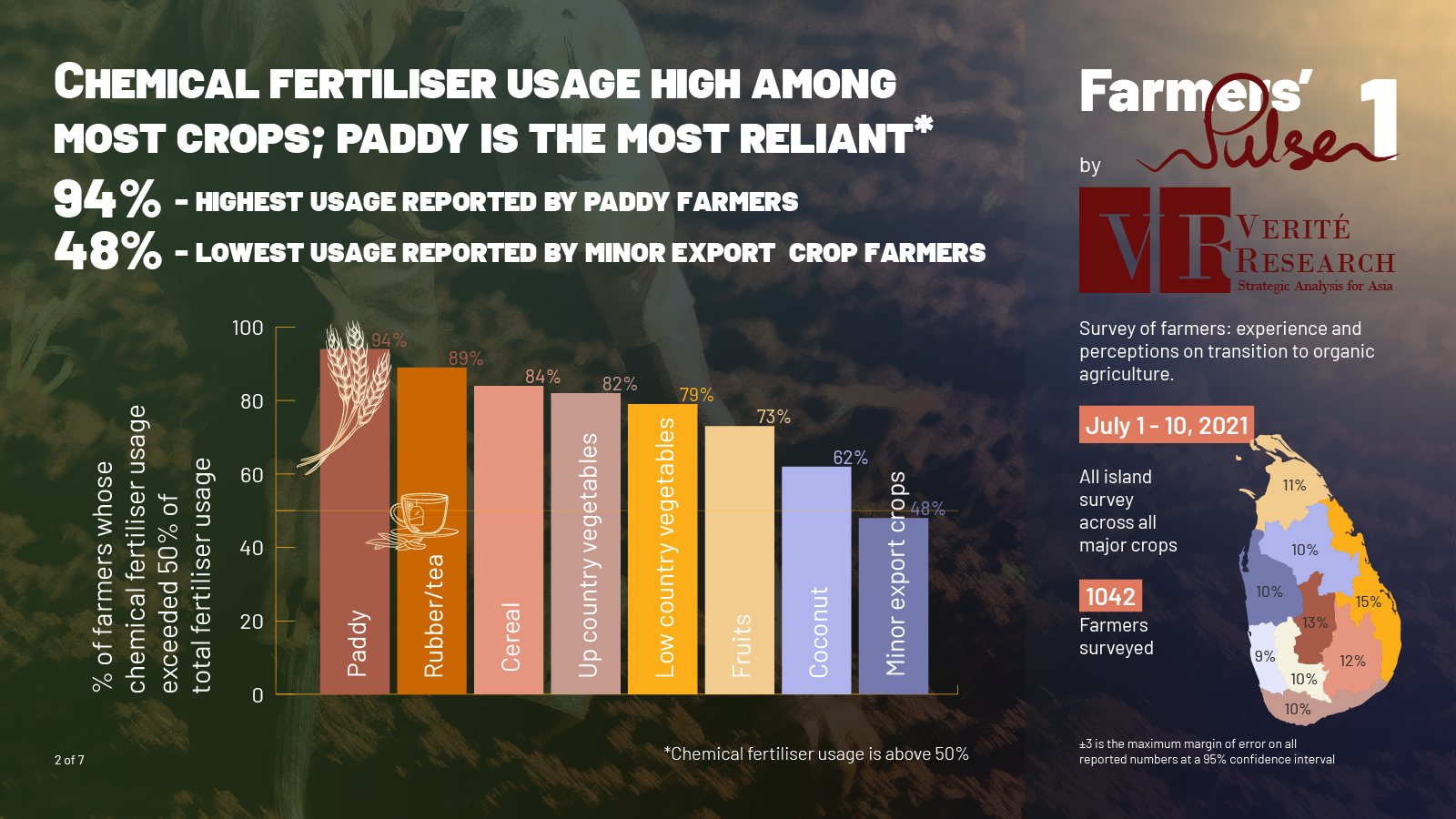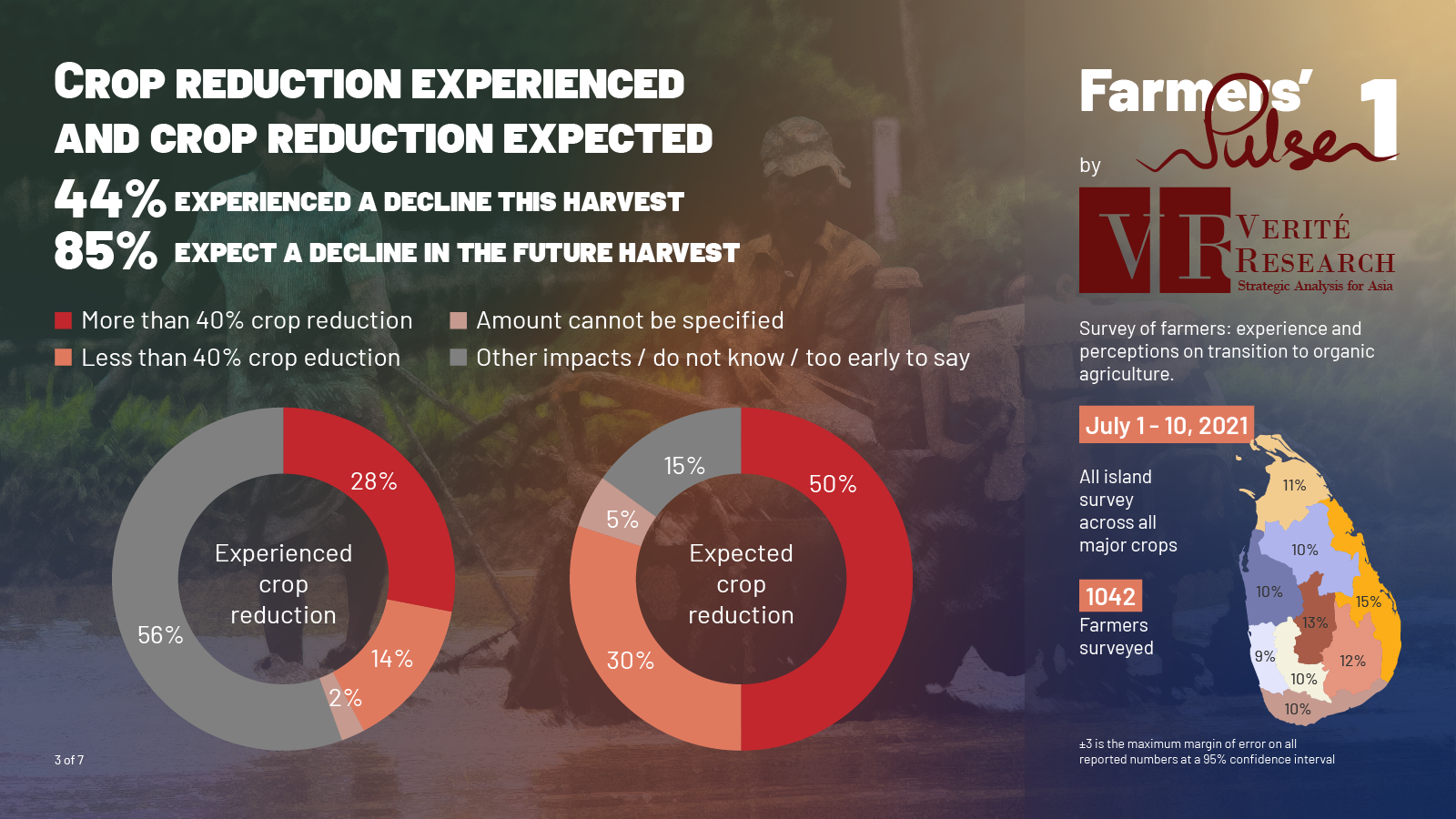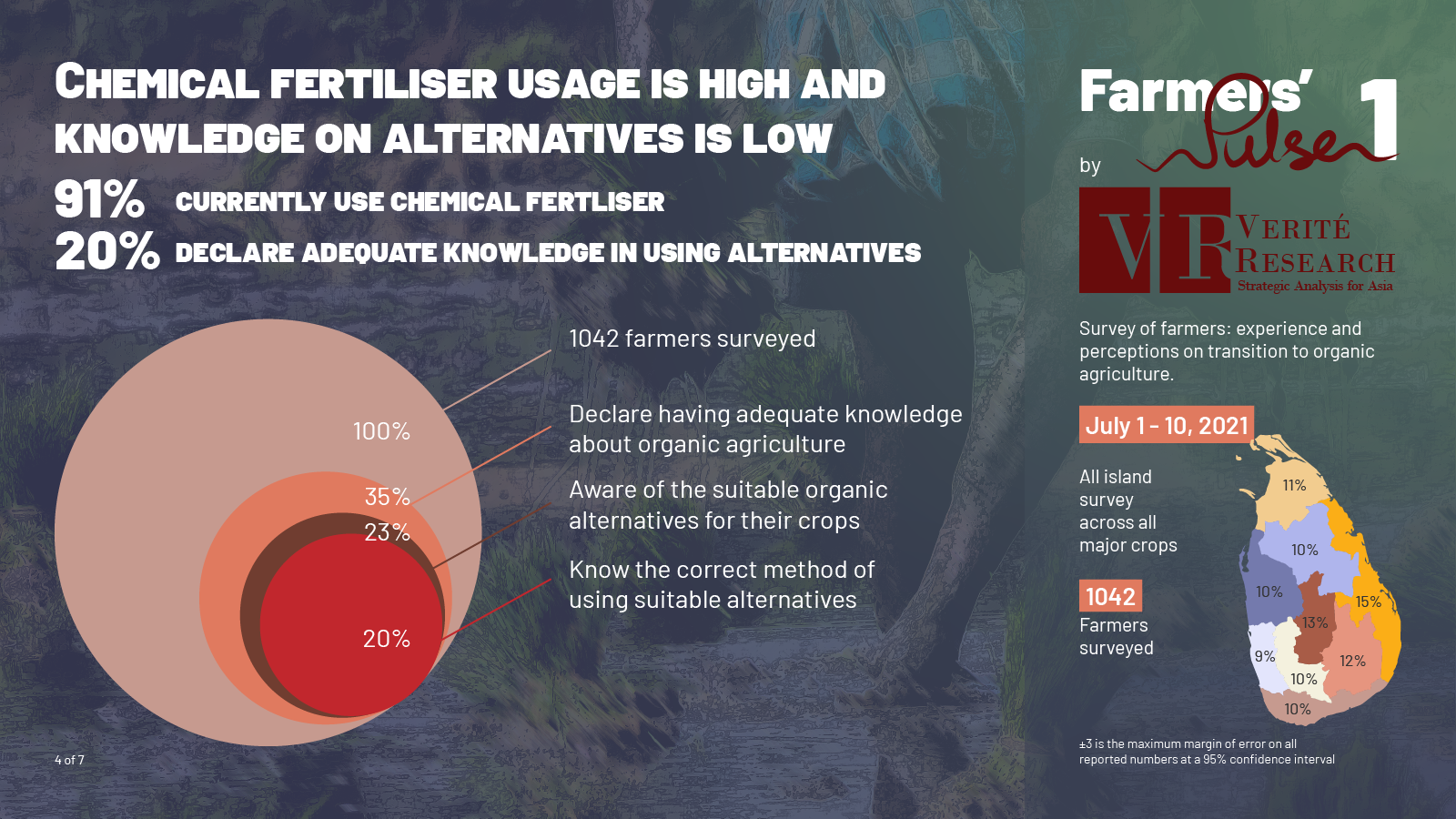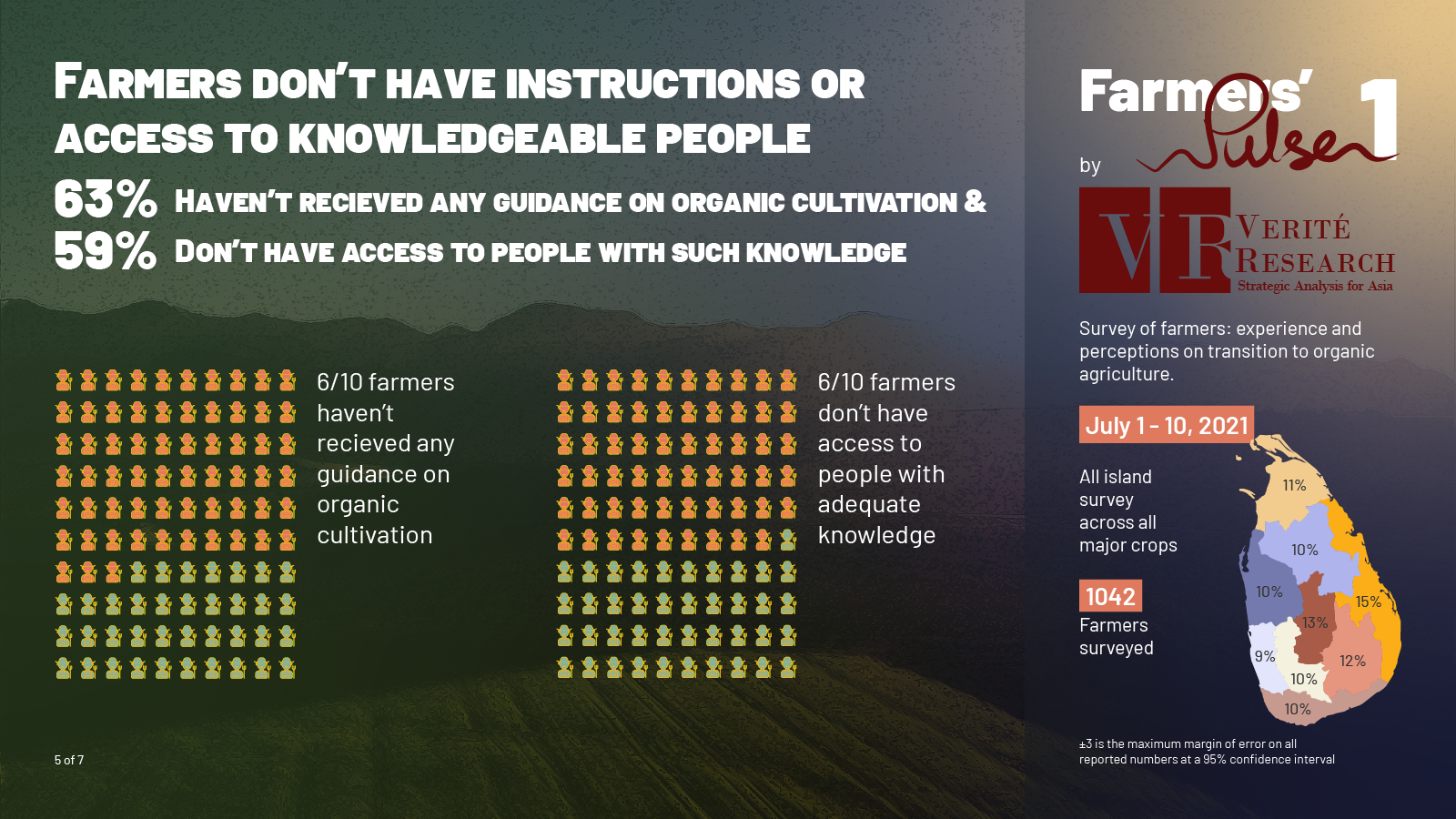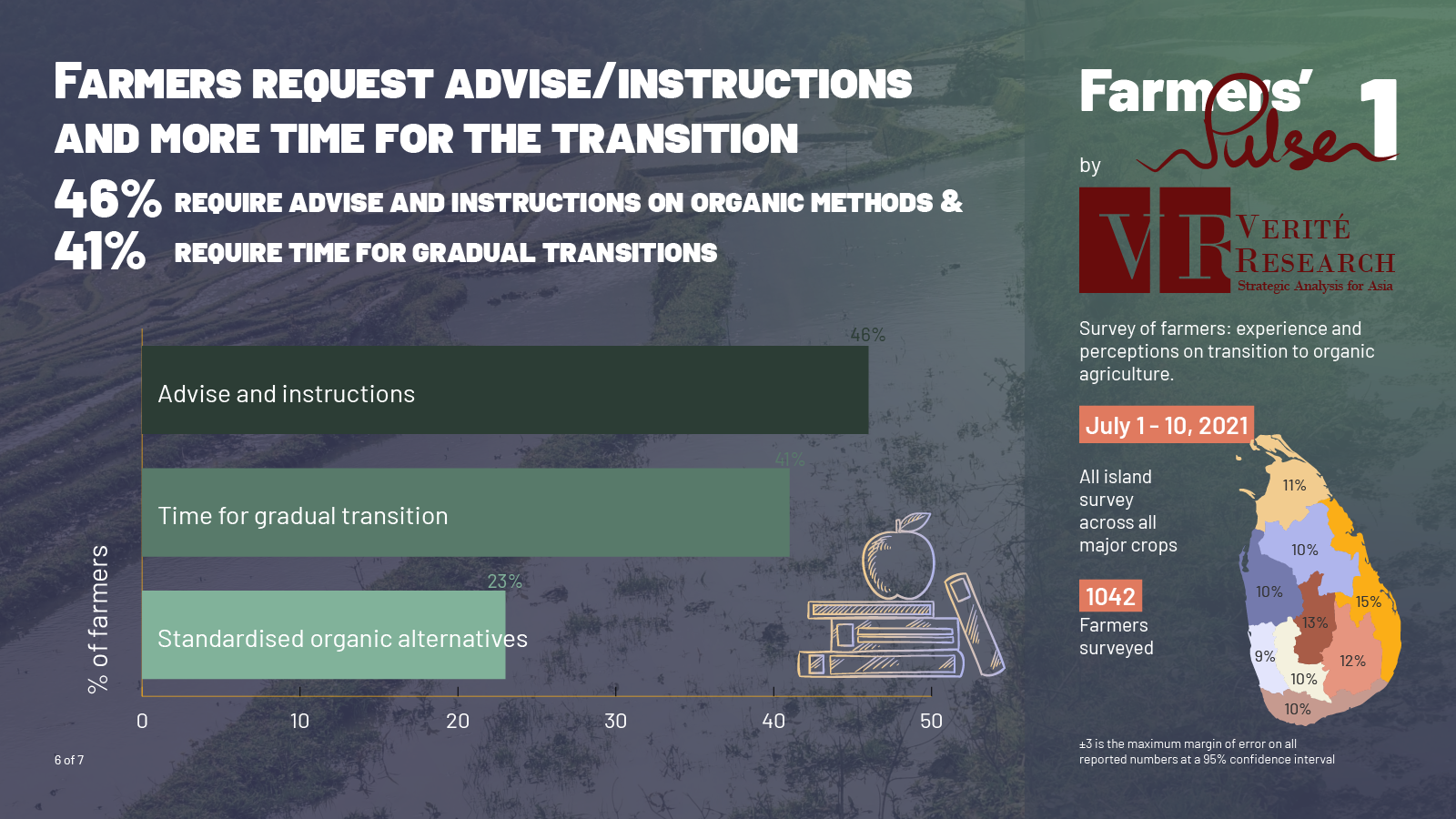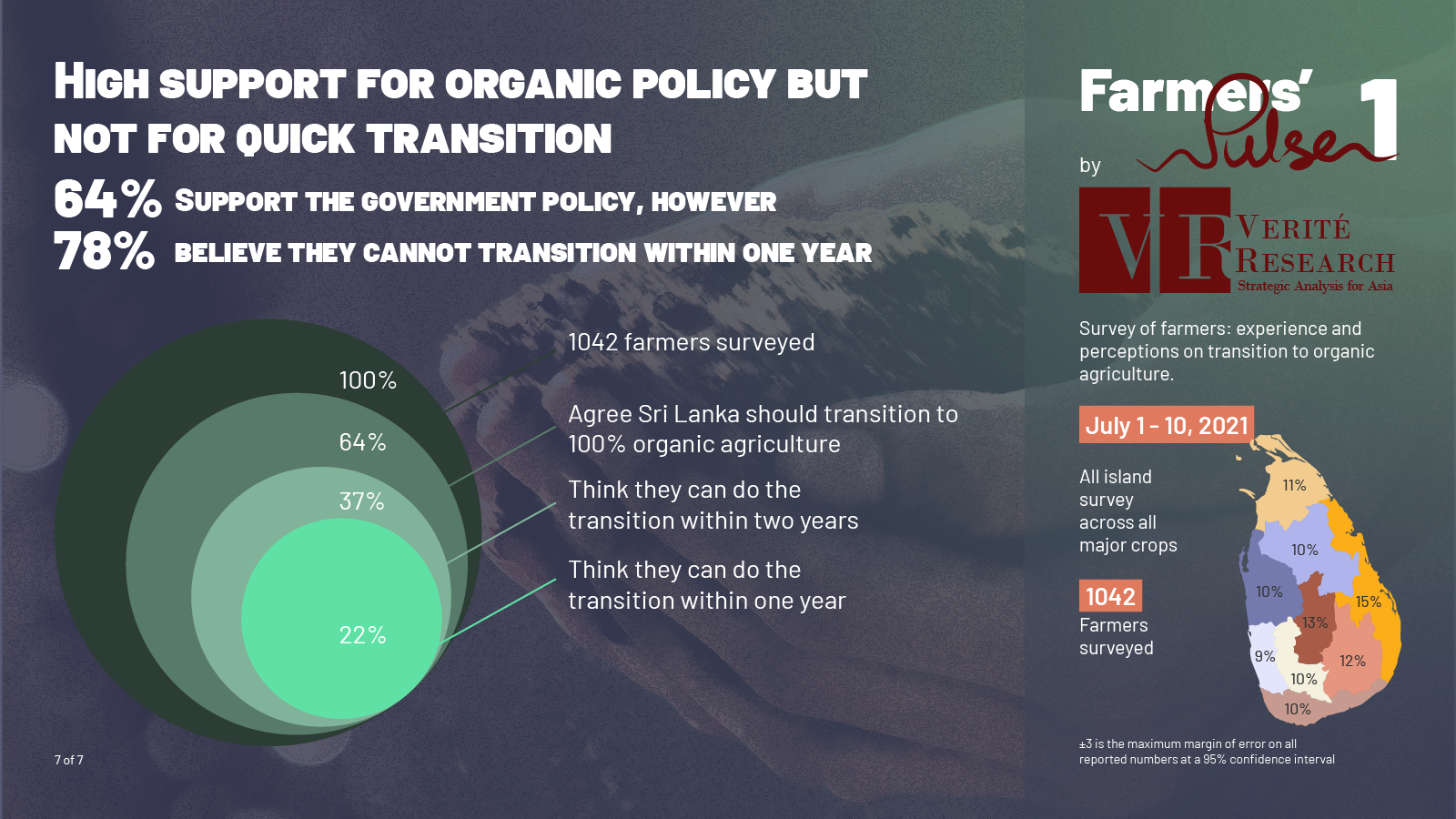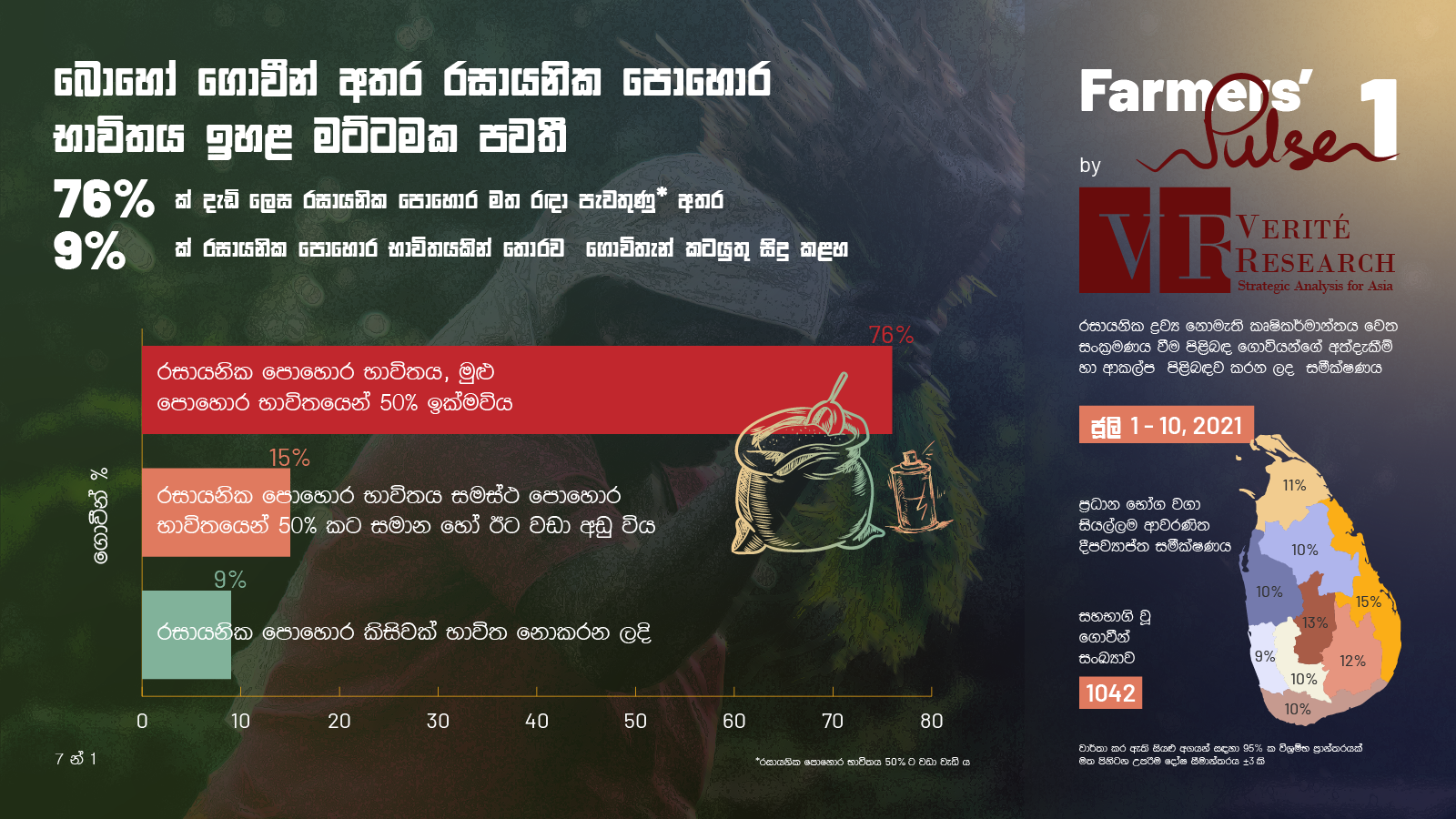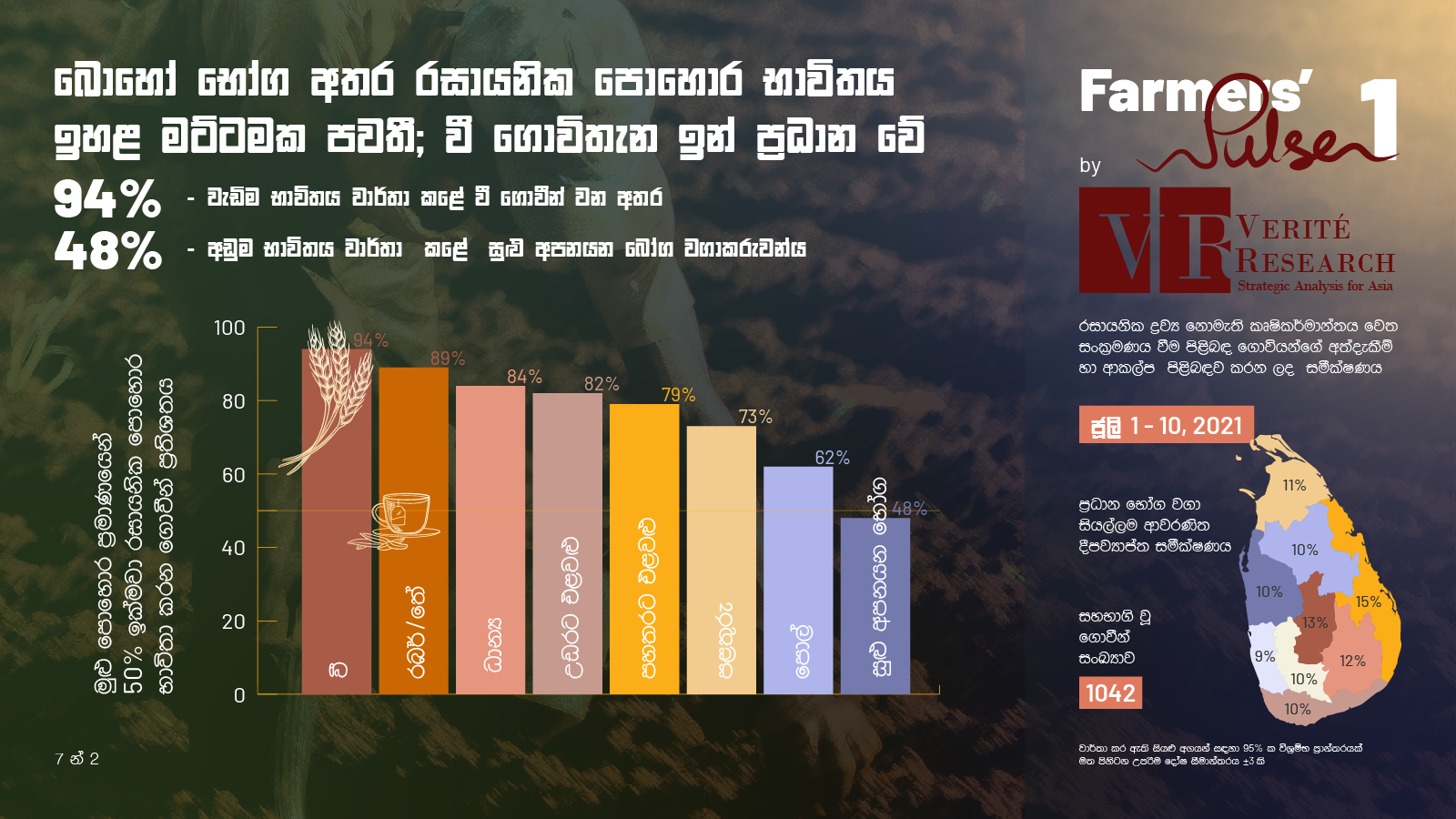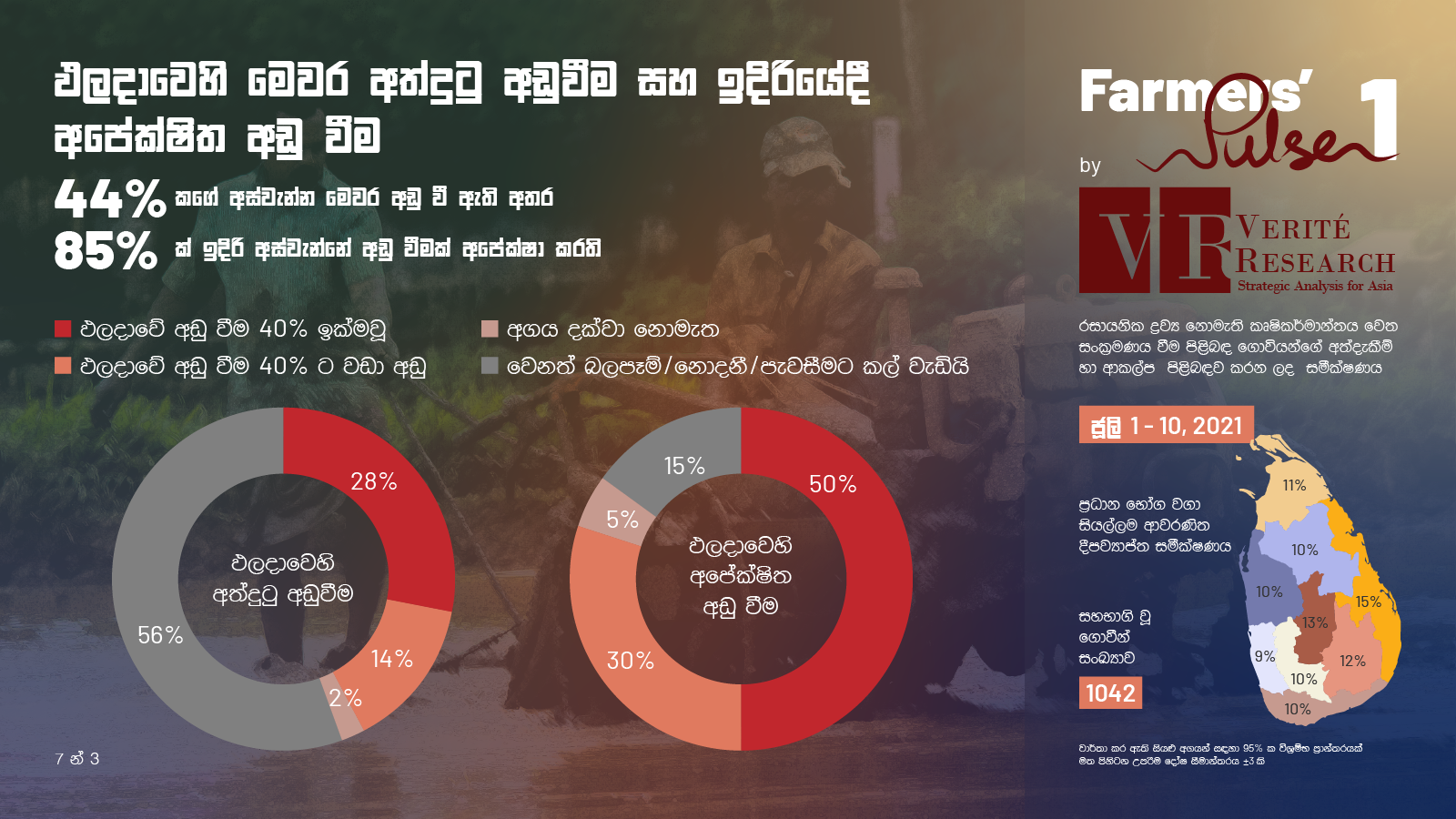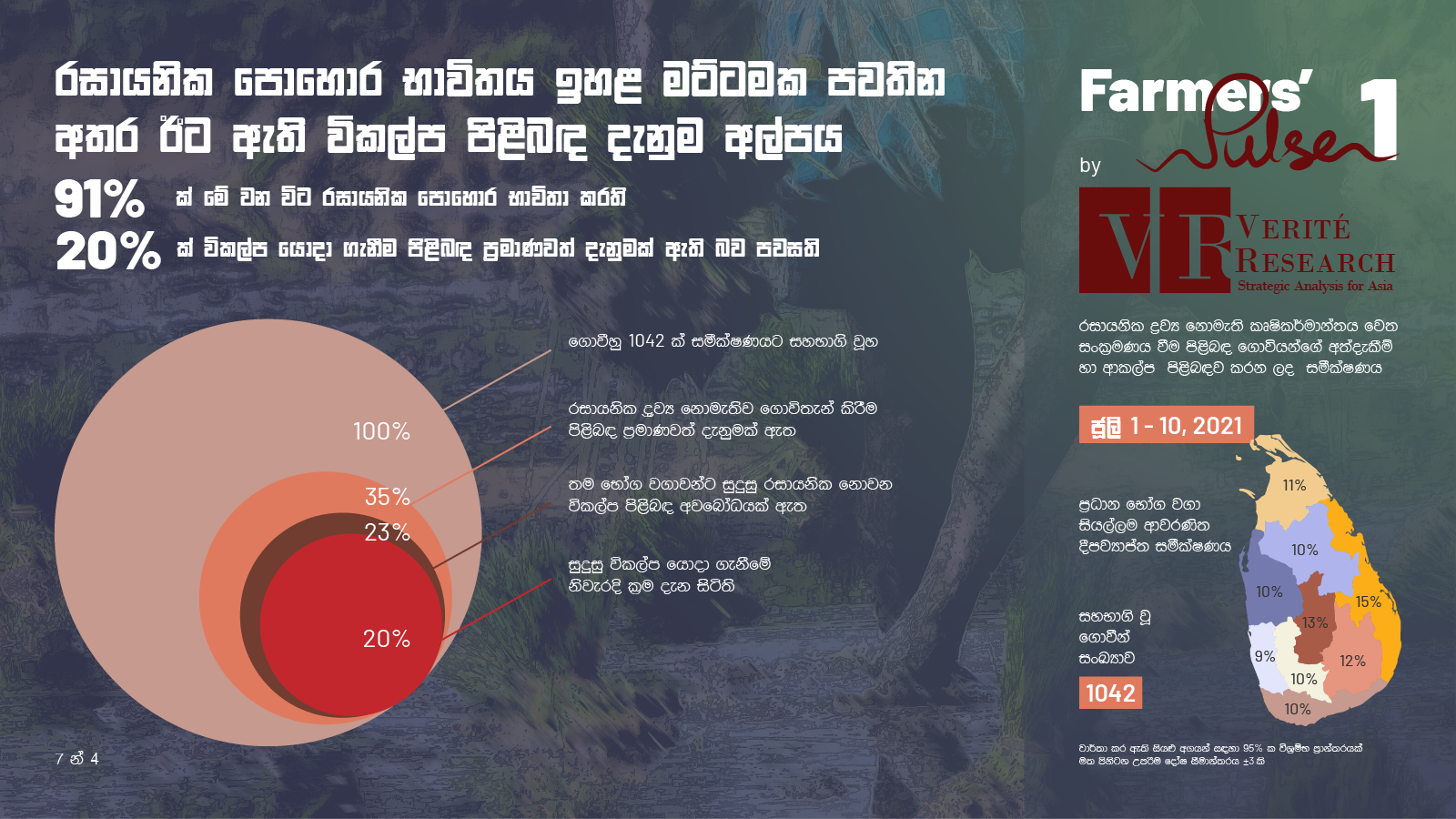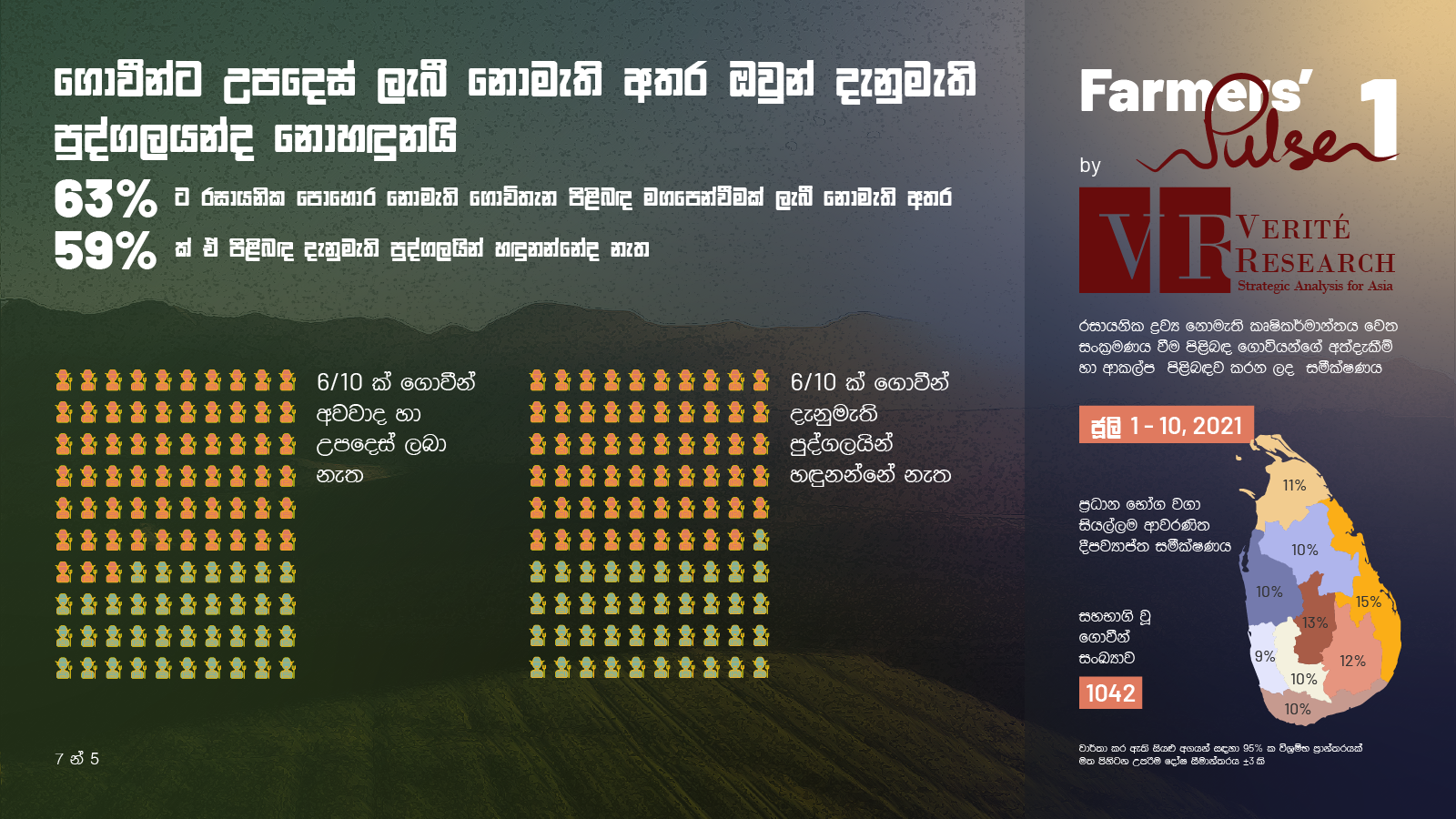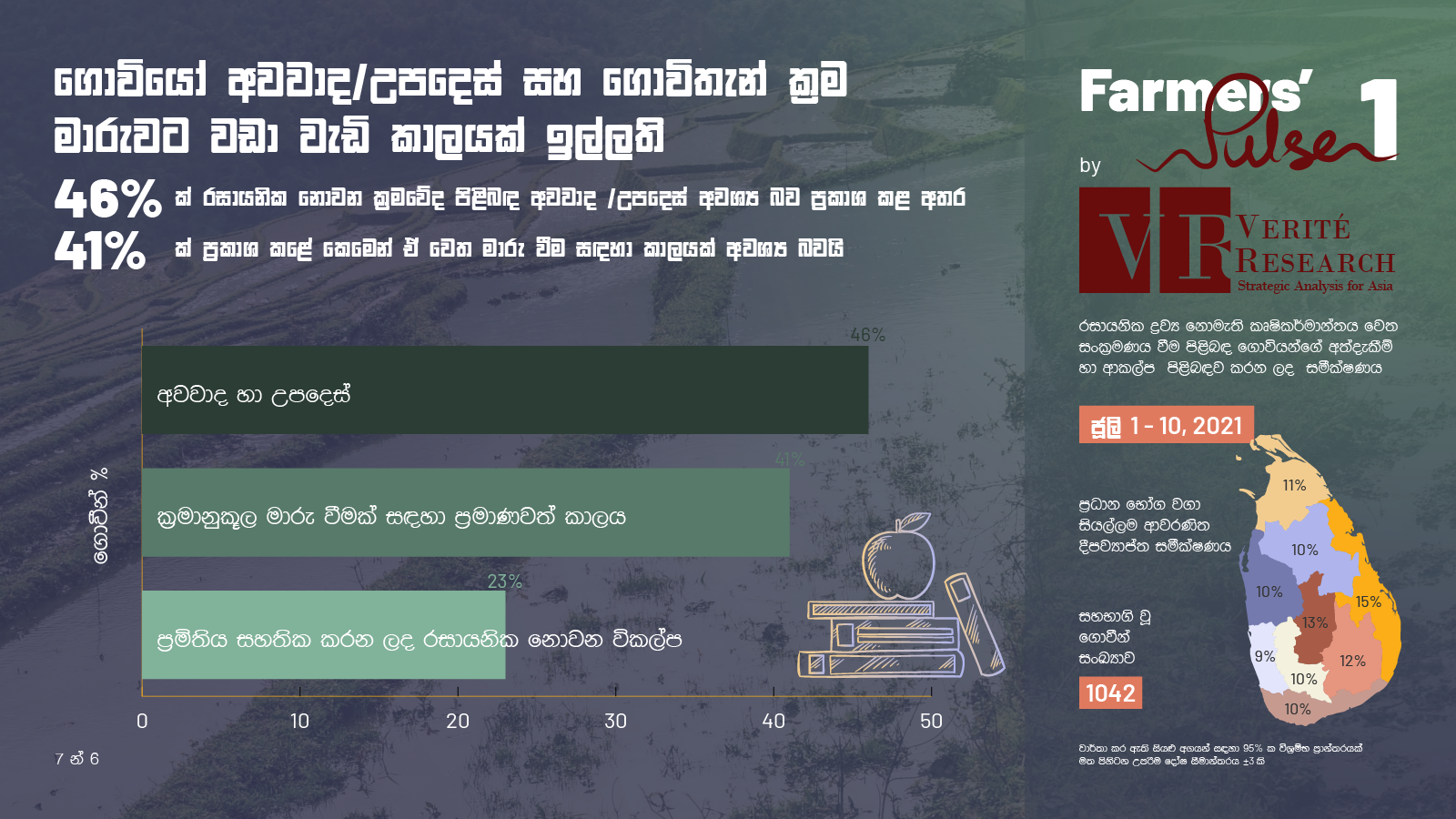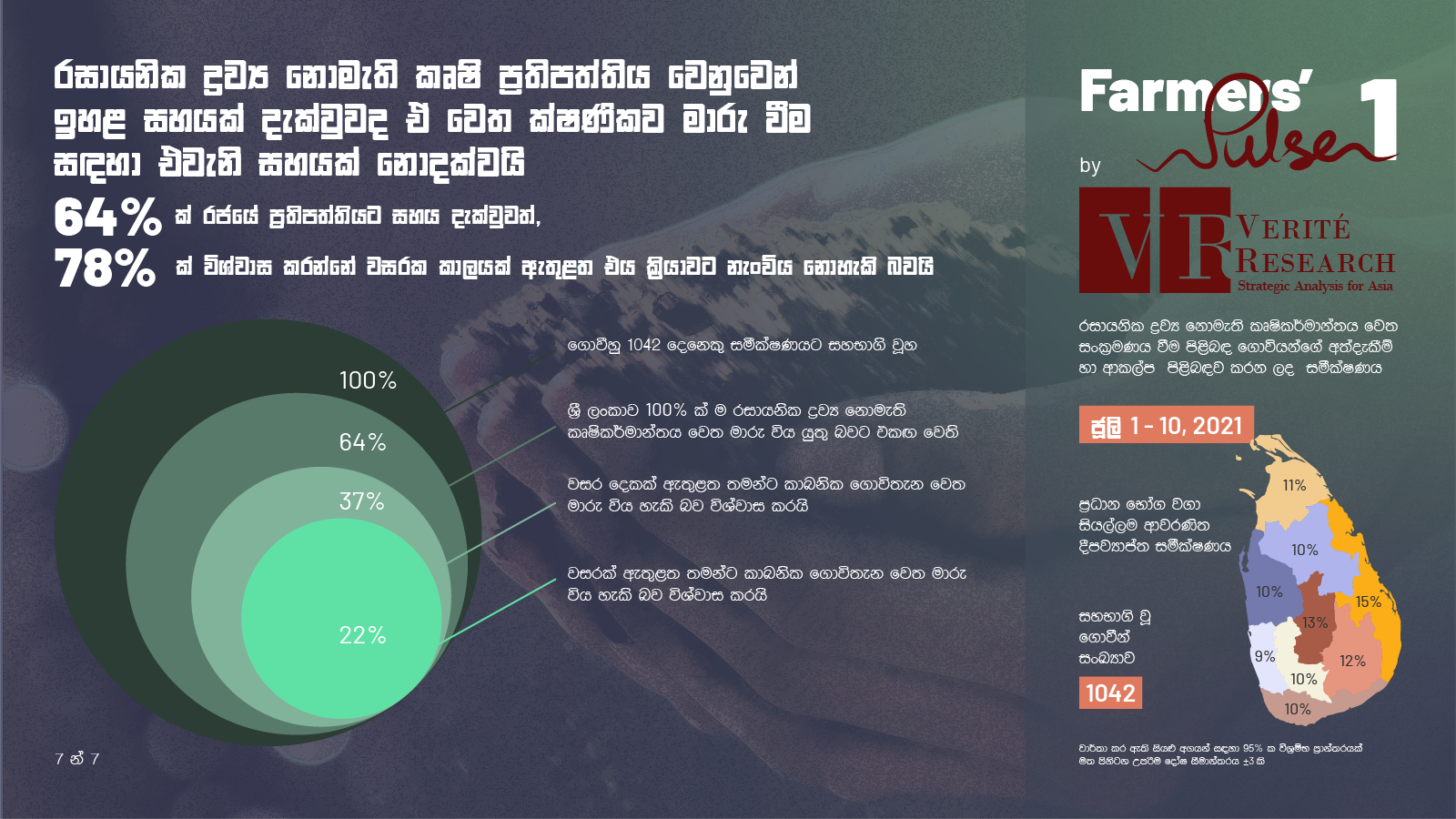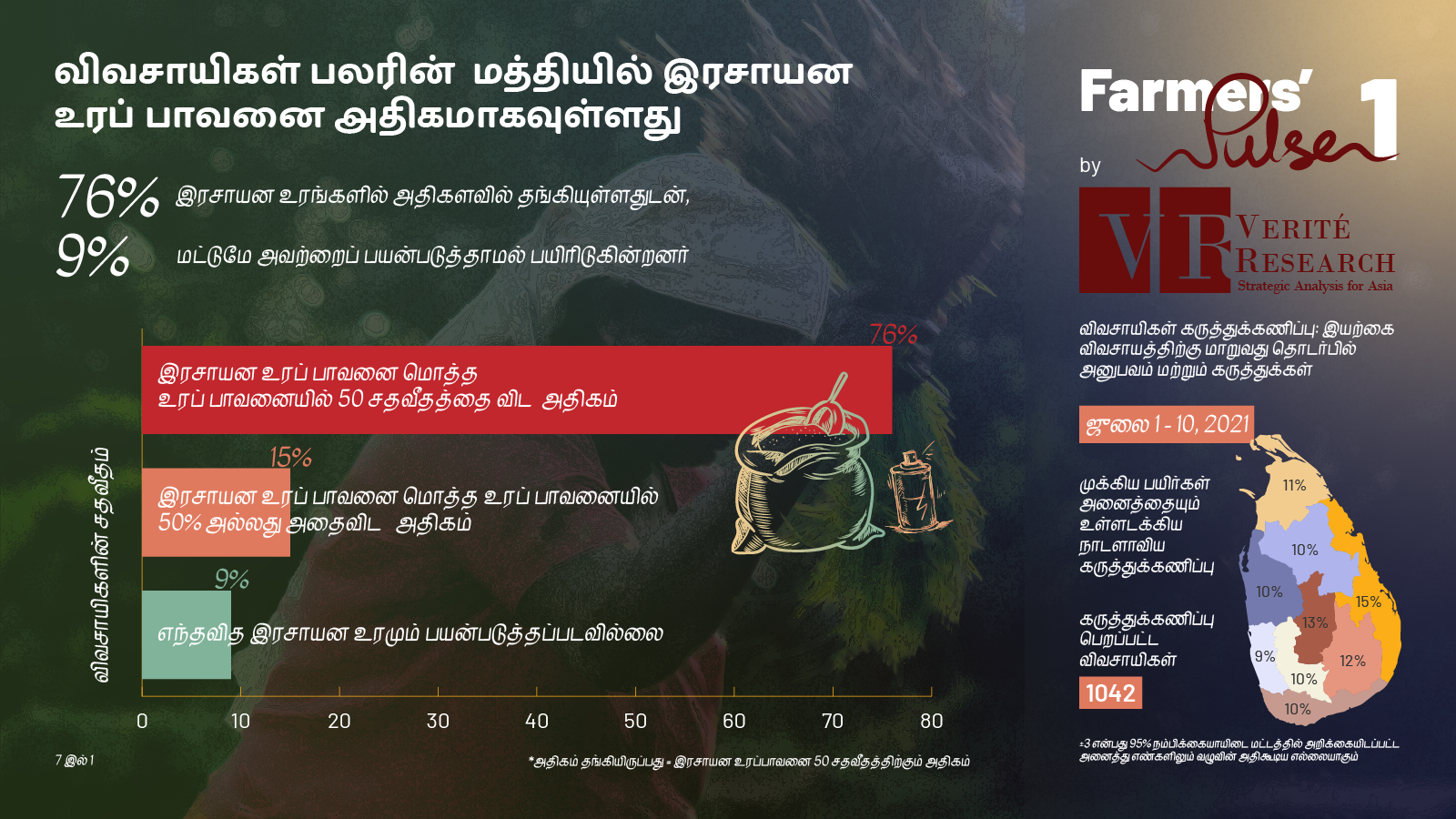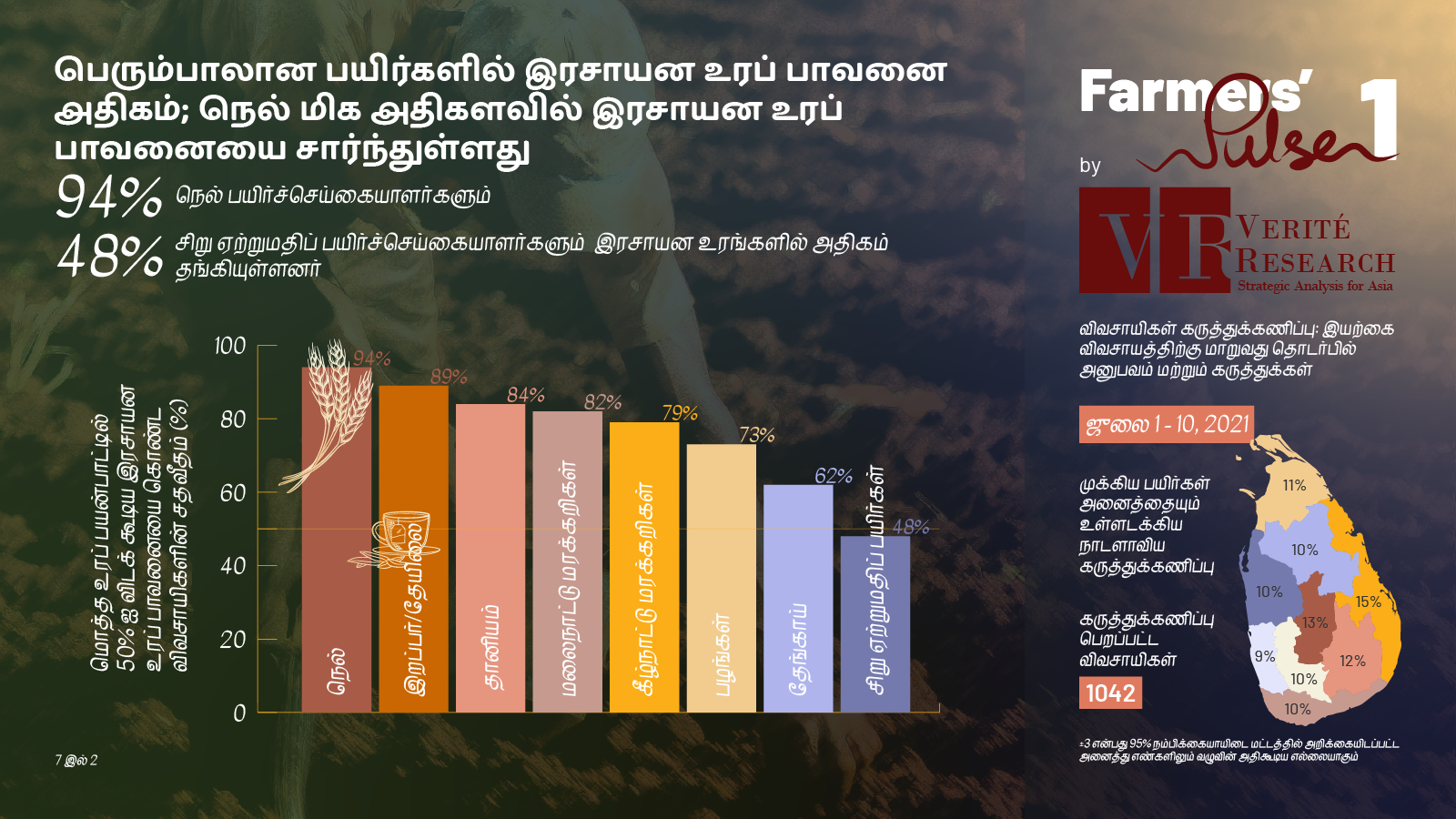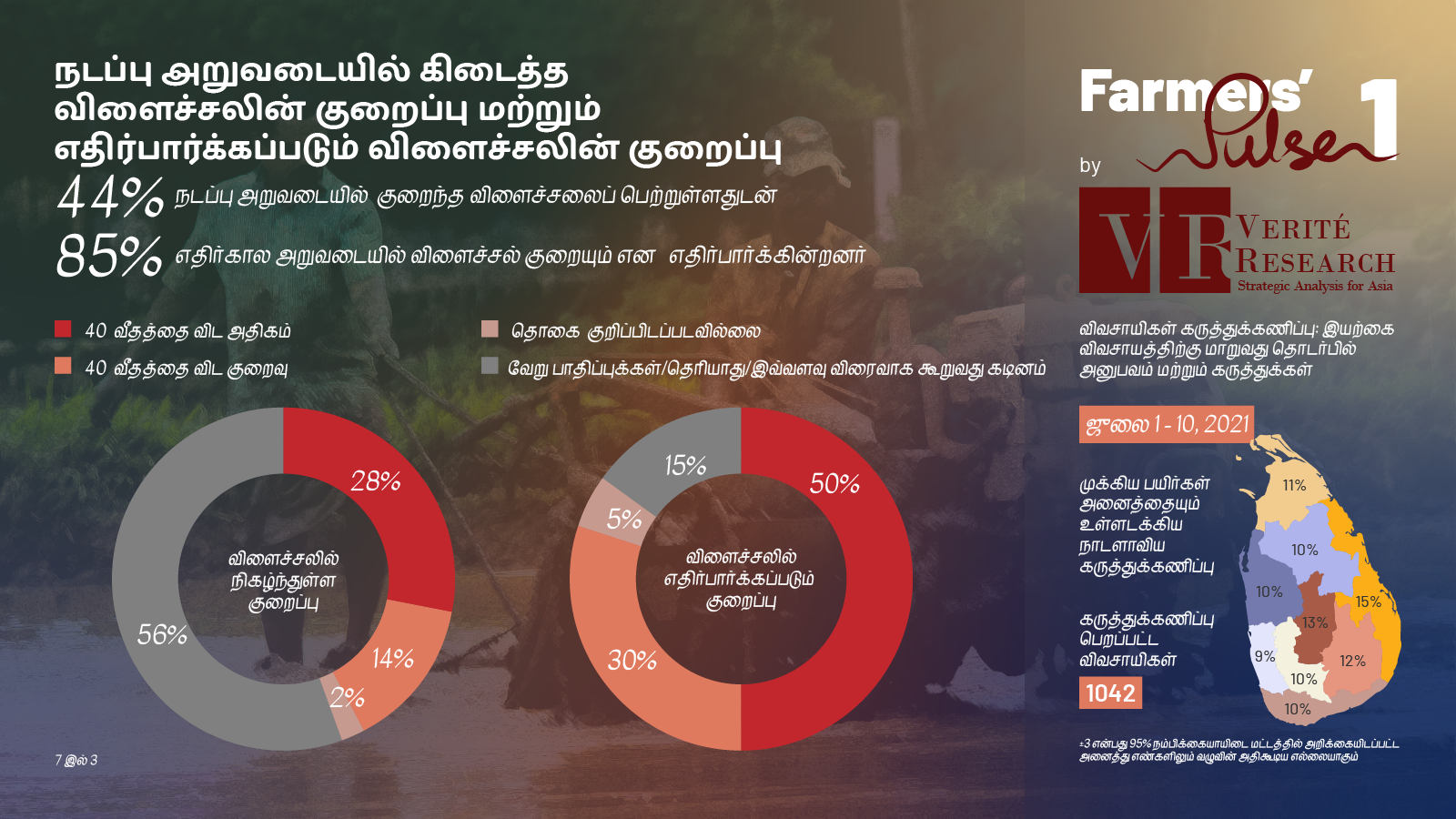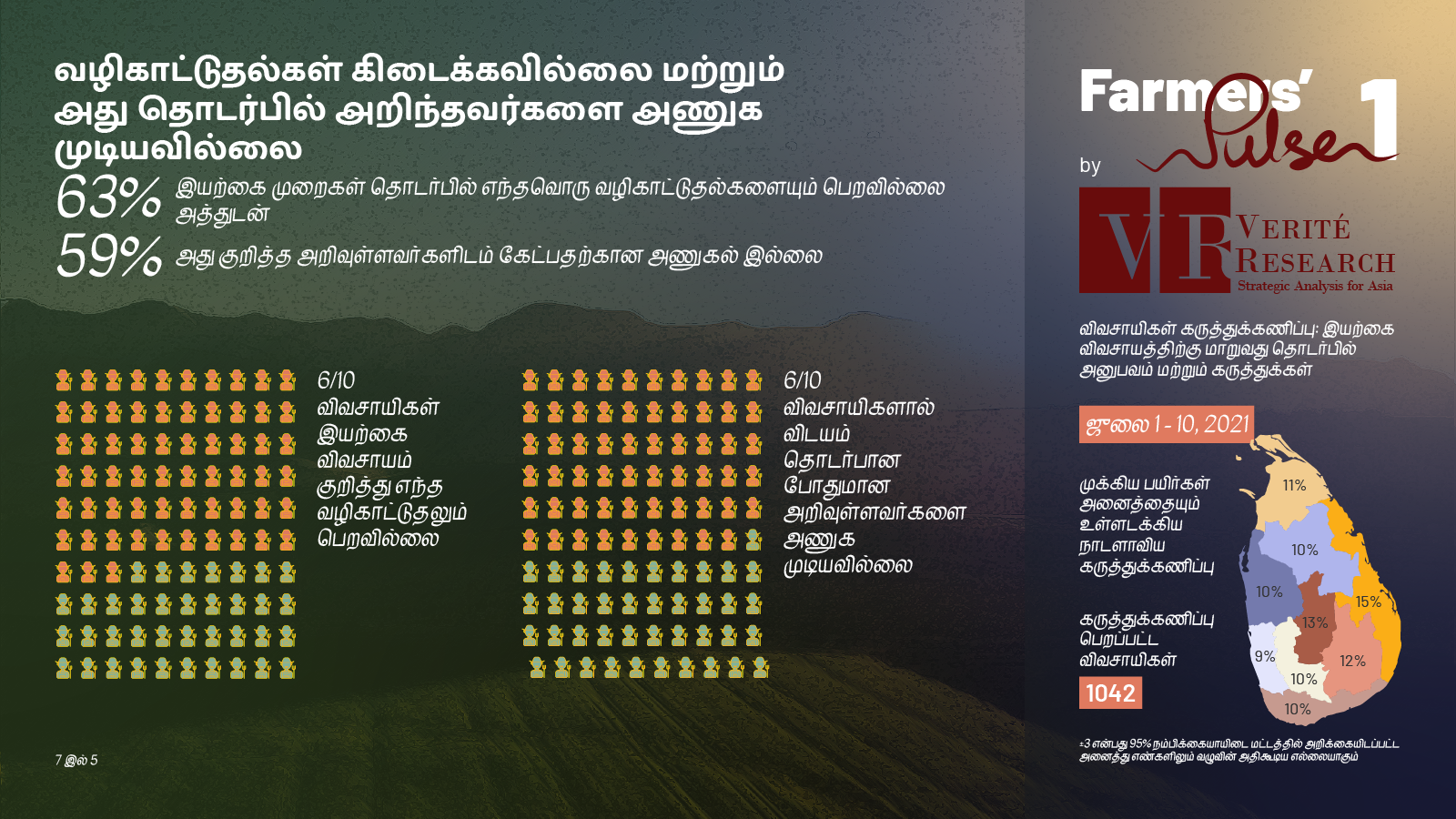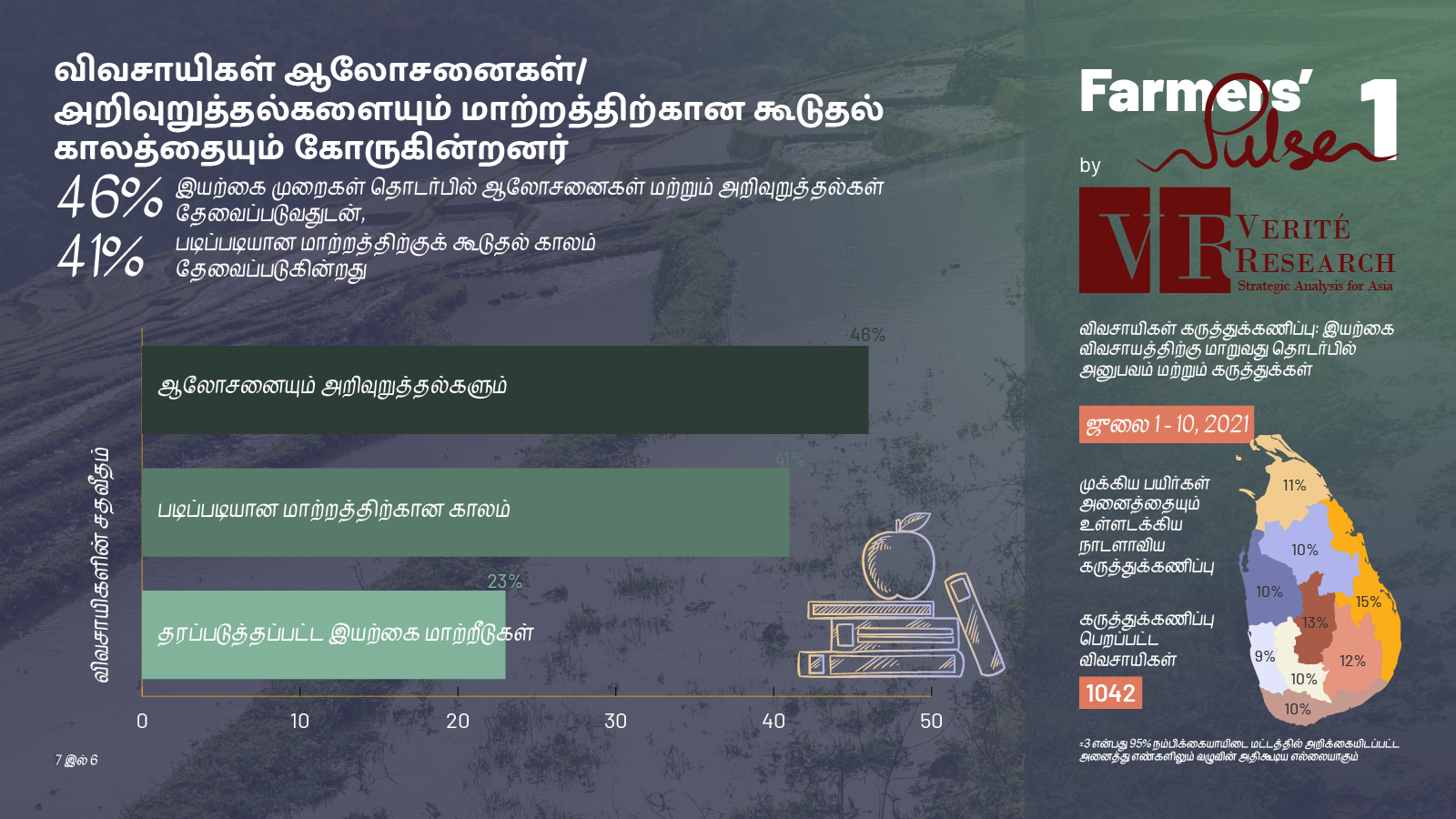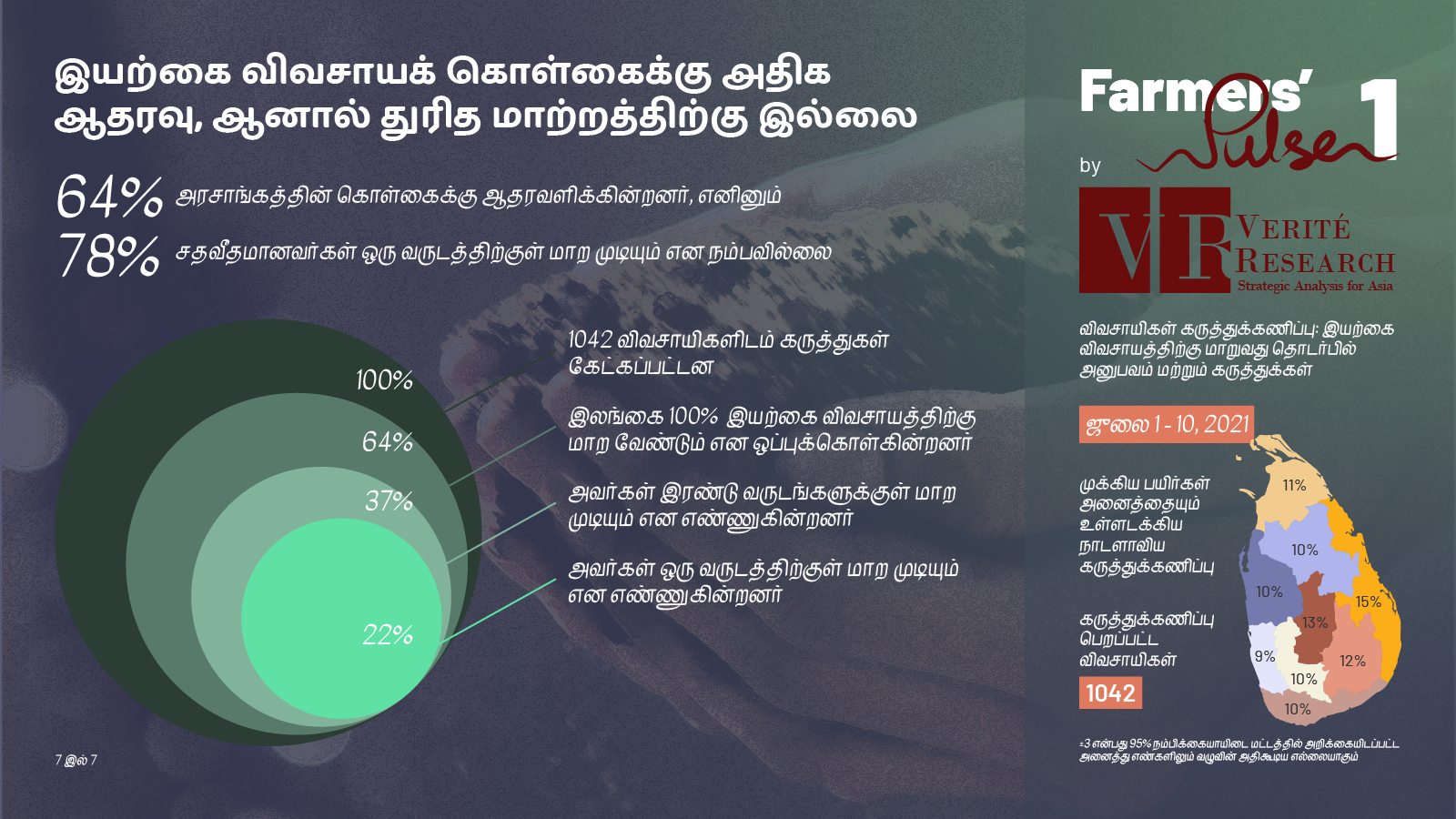Sri Lanka’s First Independent Island-Wide Farmers’ Survey on the Government’s Chemical Fertiliser Ban
On April 22, 2021, President Gotabaya Rajapaksa announced a ban on the import of chemical fertiliser in Sri Lanka. Verité Research conducted a “Farmers’ Pulse” telephone survey to elicit the views of farmers, on this policy and its expected impact. This if the first time that the perception of Sri Lankan farmers on this policy is being presented based on statistically representative island wide survey results.
Major Highlights
- Over 90% of farmers surveyed said they currently use chemical fertiliser, and almost all of them (85%) expect huge reductions in their harvest (average expected reduction of 47%) if they are not able to use chemical fertiliser.
- Almost two-thirds of the surveyed farmers said they are supportive of the government’s vision to move Sri Lanka into organic agriculture, but almost 80% of those who are supportive feel that it would require more than one year to do so.
Key Insights:
- The highest dependency on chemical fertiliser is among paddy farmers (94%) followed by tea and rubber (89%)
- There is a low level of confidence in the knowledge required for the transition. Only 20% of the farmers said they had adequate knowledge on suitable organic fertilisers and the proper application of it in their crops.
- The 3 major requests that farmers make of the government are for: (1) advice and instructions on organic fertiliser, (2) more time so that it can be a gradual transition and (3) standardised supply of organic alternatives.
Verité Research implemented this telephone survey in July 2021 among 1,042 farmers through Vanguard Survey, a specialised survey agency in Sri Lanka. The survey sample consisted of farmers who cultivated crops for commercial purposes, and the survey was distributed evenly among all nine provinces.
Additionally, only farmers who cultivate more than a half-acre and have been engaged in farming for more than three years were selected for the survey. The survey was conducted among farmers who cultivated paddy, fruits, vegetables, coconut, tea, minor export crops (spices) and cereal.
2021 අප්රේල් මස 22 වැනි දින, ජනාධිපති ගෝඨාභය රාජපක්ෂ රසායනික පොහොර ආනයනය තහනම් කරන බවට ප්රකාශ කළේය. එම ප්රතිපත්තිය හා ඉන් අපේක්ෂිත බලපෑම පිළිබඳ ගොවියන්ගේ අදහස විමසීම සඳහා වෙරිටේ රිසර්ච් ආයතනය විසින් දුරකථනය ඔස්සේ “ෆාමර්ස් පල්ස් – Farmers’ Pulse” නම් සමීක්ෂණය පවත්වන ලදි. එමෙන්ම, සංඛ්යාලේඛනාත්මකව දීපව්යාප්ත ප්රතිඵල නියෝජනය කරමින් මෙම ප්රතිපත්තිය පිළිබඳ ගොවියන්ගේ අදහස් ඉදිරිපත් කෙරෙන ප්රථම අවස්ථාවද මෙය වේ.
කැපී පෙනෙන ප්රධාන කරුණු
- සමීක්ෂණයට සහභාගි වූ ගොවීන් අතරින් 90% ට වඩා වැඩි දෙනෙක් දැනට රසායනික පොහොර භාවිතා කරන බව පැවසූහ. රසායනික පොහොර භාවිතා කිරීමට නොහැකි වුවහොත් ඉන් වැඩි පිරිසක් (85%) තම ඵලදාවේ විශාල අඩු වීමක් බලාපොරොත්තු වෙති (අපේක්ෂිත අඩු වීමේ සාමාන්යය 47%කි).
- ශ්රී ලංකාව රසායනික ද්රව්ය භාවිතයෙන් තොරව කෙරෙන ගොවිතැනට මාරු කිරීම සඳහා රජයට ඇති දැක්මට සහය දක්වන බව ගොවියන්ගෙන් තුනෙන් දෙකකට ආසන්න සංඛ්යාවක් පැවසූහ. එහෙත්, එසේ සහය පළ කළ ගොවීන්ගෙන් 80% ට ආසන්න සංඛ්යාවක් එම පරිවර්තනය සඳහා වසරකට වඩා වැඩි කාලයක් ගත වනු ඇතැයි විශ්වාස කරති.
ලැබූ මූලික අවබෝධයන්
- වැඩිම රසායනික පොහොර භාවිතය වාර්තා වූයේ වී ගොවීන් ඇසුරින් වන අතර, එම ගොවීන්ගේ ප්රතිශතය 94% ක් විය. දෙවනුවට වැඩිම රසායනික පොහොර භාවිතය වාර්තා වූයේ තේ හා රබර් වගා කරන්නන්ගෙනි. එම ප්රතිශතය 89% කි.
- රසායනික ද්රව්යවලින් තොර කෘෂිකර්මාන්තයට මාරු වීමට අවශ්ය දැනුම පිළිබඳ විශ්වාසය ඉතා අඩු මට්ටමක පවතී. සුදුසු කාබනික පොහොර සහ එය භෝගවලට යොදන නිවැරදි ආකාරය පිළිබඳ දැනුම ඇතැයි ප්රකාශ කළේ ගොවීන්ගෙන් 20%ක් පමණි.
- ගොවි ජනතාව රජය වෙතට යොමු කරන ප්රධාන ඉල්ලීම් 3 වන්නේ (1) කාබනික පොහොර පිළිබඳ අවවාද හා උපදෙස් ලබා දීම (2) ක්රමයෙන් ඒ වෙතට මාරු වීම සඳහා ප්රමාණවත් කාලයක් ලබා දීම සහ (3) ප්රමිතිගත කරන ලද කාබනික විකල්ප සැපයුමයි.
වෙරිටේ රිසර්ච් ආයතනය විසින් ශ්රී ලංකාවේ විශේෂිත සමීක්ෂණ ආයතනයක් වන වැන්ගාඩ් සර්වේ ආයතනය හරහා, ගොවීන් 1,042 ක් සම්බන්ධ කර ගනිමින්, 2021 ජූලි මාසයේ දුරකථනය ඔස්සේ මෙම සමීක්ෂණය පවත්වන ලදි. වාණිජමය වශයෙන් භෝග වගා කරන ගොවීන්ගෙන් සමීක්ෂණ නියැදිය සමන්විත වූ අතර එය පළාත් 9 හරහා සමව බෙදී ගොස් තිබිණ.
තවද, අක්කර භාගයකට වඩා වැඩි භූමි ප්රමාණයක් වගා කරන සහ වසර 3ට වඩා ගොවිතැනෙහි නියැලී සිටින ගොවීන් පමණක් සමීක්ෂණය සඳහා තෝරා ගන්නා ලදි. වී, පළතුරු, එළවළු, පොල්, තේ, සුළු අපනයන බෝග (කුළුබඩු) සහ ධාන්ය වර්ග වගා කරන ගොවීන් අතර මෙම සමීක්ෂණය සිදු කරන ලදි.
ஜனாதிபதி கோத்தாபய ராஜபக்ஸ இலங்கையில் இரசாயன உர இறக்குமதிக்குத் தடை விதித்து ஏப்ரல் 22, 2021 அறிவிப்பொன்றை வெளியிட்டார். இந்தக் கொள்கை தொடர்பிலும் அதன் மூலம் எதிர்பார்க்கப்படும் தாக்கம் குறித்தும் இலங்கை விவசாயிகளின் கருத்தைப் பெறுவதற்கு வெரிட்டே ரிசேர்ச் ”பாமர்ஸ் பல்ஸ்-Farmers’ Pulse” என்னும் தொலைபேசி மூலமான கருத்துக்கணிப்பை முன்னெடுத்தது. முழு இலங்கையையும் பிரதிநிதித்துவப்படுத்தும் கருத்துக்கணிப்பு முடிவுகளின் அடிப்படையில் இந்தக் கொள்கை தொடர்பில் விவசாயிகளின் கருத்து முன்வைக்கப்படுவது இதுவே முதன் முறையாகும்.
முக்கிய விடயங்கள்
- கருத்துக்கணிப்பில் கலந்துகொண்ட விவசாயிகளில் 90 சதவீதத்திற்கும் அதிகமானவர்கள் தற்போது இரசாயன உரங்களைப் பயன்படுத்துவதாகத் தெரிவிக்கின்றனர். அவர்களில் அநேகமானவர்கள் (85%) இரசாயன உரங்களைப் பயன்படுத்த முடியாவிட்டால் அறுவடை பாரிய அளவு குறையும் (சராசரியாக 47% குறையும் என எதிர்பார்க்கப்படுகிறது) என எதிர்பார்க்கின்றனர்.
- இயற்கை விவசாயத்தை நோக்கி இலங்கையைக் கொண்டு செல்லும் அரசாங்கத்தின் இலக்கிற்கு ஏறத்தாழ மூன்றில் இரண்டு பங்கு விவசாயிகள் ஆதரவு தெரிவிக்கின்றனர். ஆனால் அவர்களில் 80 சதவீதமானவர்கள் இதனைச் செய்து முடிப்பதற்கு ஒரு வருடத்திற்கு மேல் தேவைப்படும் எனக் கருதுகின்றனர்.
முக்கிய கண்டுபிடிப்புகள்
- இரசாயன உரங்களில் அதிகளவில் தங்கியிருப்பது நெல் பயிர்ச்செய்கையாளர்கள் (94%) அவர்களுக்கு அடுத்து தேயிலை மற்றும் இறப்பர் (89%) செய்கையாளர்கள்.
- இந்த மாற்றத்திற்குத் தேவையான அறிவு தொடர்பில் நம்பிக்கை குறைவாகக் காணப்படுகிறது. பொருத்தமான இயற்கை உரங்கள் மற்றும் அவற்றைப் பயிர்களுக்குப் பயன்படுத்துவதற்கான சரியான முறை தொடர்பில் 20% விவசாயிகள் மட்டுமே போதுமான அறிவைக் கொண்டிருப்பதாகத் தெரிவித்துள்ளனர்.
- விவசாயிகள் அரசாங்கத்திடம் முன்வைக்கும் மூன்று முக்கிய கோரிக்கைகள் 1) இயற்கை உரங்கள் தொடர்பில் ஆலோசனை மற்றும் அறிவுறுத்தல்கள் 2) கூடுதல் காலம், இதன் மூலம் படிப்படியான மாற்றம் ஏற்படும் 3) இயற்கை மாற்றுகளின் தரப்படுத்தப்பட்ட விநியோகம்.
இலங்கையில் நிபுணத்துவம் வாய்ந்த கருத்துக்கணிப்பு முகவரகமான வான்கார்ட் சர்வே (Vanguard Survey) ஊடாக இந்தத் தொலைபேசி வாயிலான கருத்துக்கணிப்பை 1,042 விவசாயிகளிடம் 2021 யூலையில் வெரிட்டே ரிசேர்ச் நடாத்தியது. இந்தக் கருத்துக்கணிப்புக்கான மாதிரியானது வர்த்தக நோக்கங்களுக்காகப் பயிர்ச்செய்கையில் ஈடுபட்டுள்ள விவசாயிகளை உள்ளடக்கியதுடன், 9 மாகாணங்களுக்கும் இடையே சம அளவில் பிரிக்கப்பட்டுள்ளது.
மேலும், அரை ஏக்கருக்கு மேல் பயிர்ச் செய்கை மேற்கொள்வதோடு மூன்று ஆண்டுகளுக்கும் மேலாக விவசாயத்தில் ஈடுபட்டுள்ள விவசாயிகள் மட்டுமே இக் கருத்துக்கணிப்புக்கு தேர்ந்தெடுக்கப்பட்டனர். நெல், பழங்கள், மரக்கறிகள், தேங்காய், தேயிலை, சிறு ஏற்றுமதிப் பயிர்கள் (வாசனைப் பொருட்கள்) மற்றும் சிறுதானியங்கள் ஆகியவற்றைப் பயிரிடும் விவசாயிகளிடையே இந்தக் கருத்துக்கணிப்பு முன்னெடுக்கப்பட்டது.
